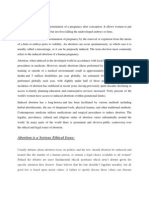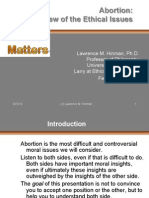0% found this document useful (0 votes)
16 views6 pagesNardo
The document discusses the complex debate surrounding abortion, emphasizing the importance of bodily autonomy, public health, and social justice in favor of keeping abortion legal and accessible. It acknowledges the moral concerns of opponents while arguing for thoughtful regulation to balance rights and ethical standards. Ultimately, it advocates for individual control over personal decisions regarding abortion in a free society.
Uploaded by
abraham.mahilumCopyright
© © All Rights Reserved
We take content rights seriously. If you suspect this is your content, claim it here.
Available Formats
Download as PDF, TXT or read online on Scribd
0% found this document useful (0 votes)
16 views6 pagesNardo
The document discusses the complex debate surrounding abortion, emphasizing the importance of bodily autonomy, public health, and social justice in favor of keeping abortion legal and accessible. It acknowledges the moral concerns of opponents while arguing for thoughtful regulation to balance rights and ethical standards. Ultimately, it advocates for individual control over personal decisions regarding abortion in a free society.
Uploaded by
abraham.mahilumCopyright
© © All Rights Reserved
We take content rights seriously. If you suspect this is your content, claim it here.
Available Formats
Download as PDF, TXT or read online on Scribd
/ 6































































































